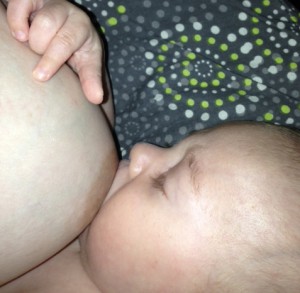Jane contacted me because she had returned to work and she was worried about her milk production. Her baby, Ernie, was 3 months old and she’d just started working 3 days/week. We set up a phone consultation and she shared the following:
- Away from her baby 8:30 a.m. To 4:00 p.m.
- Pumps twice a day at the office for about 25 minutes each time.
- Tries to pump at home so she can increase her supply as her baby grows.
- Leaving 4 bottles of milk at the day care each day.
- Ernie drinks 2-3 bottles at day care.
- Feels rested and Ernie is thriving.
- Eating milkmakers cookies for milk production.


 “My pediatrician says my baby has reflux! She says there are medications to help. I really don’t want my baby to take medicine. He’s so little. But I also don’t want him to suffer and spit up so much. What should I do? Can you help me?”
“My pediatrician says my baby has reflux! She says there are medications to help. I really don’t want my baby to take medicine. He’s so little. But I also don’t want him to suffer and spit up so much. What should I do? Can you help me?”